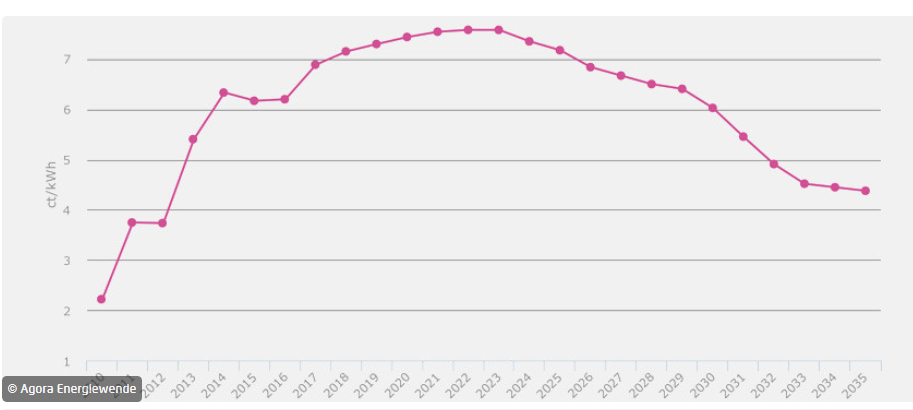Renewable energy levy set to rise in 2017 – think tank
Consumers could be paying 7.1 to 7.3 cents per kilowatt-hour (kWh) in surcharges for renewable energy in 2017, think tank Agora Energiewende has calculated. In 2016 the levy amounted to 6.35 ct/kWh. The EEG surcharge makes up the difference between the market price for electricity and feed-in tariffs guaranteed to renewable power producers.
Using renewables like solar and wind to cover an ever-larger share of Germany’s power demand is key to the Energiewende – the country’s strategy to decarbonise the economy and phase-out nuclear energy. Renewables are now Germany’s biggest source of electricity. But over recent years there have been concerns over the cost of the energy transition. (See CLEW factsheets on household and industry power prices).
Germany recently reformed its Renewable Energy Act, replacing guaranteed feed-in tariffs for large new installations with an auction system designed to expose the sector to market forces. In June 2016, Economy and Energy Minister Sigmar Gabriel assured citizens that the new legislation would stabilise prices, adding that the energy transition could now be “an economic success story”.
“It’s a fact that the EEG reform has dampened the rise in the renewables surcharge but it hasn’t stopped it,” Joachim Pfeiffer, energy expert of the conservative Christian Democratic Union party in the Federal Parliament told Clean Energy Wire | CLEW. First the “gigantic subsidies of the past” had to be gradually reduced, he said. Billions of euros in renewables support per year and additional re-dispatch costs were a burden on the public acceptance of the energy transition.
Feed-in tariffs are guaranteed for 20 years, and have been reduced as the cost of renewable power installations has fallen. The renewable installations receiving the highest payments through the surcharge are old solar PV systems installed at a time when high feed-in tariffs were aimed at kick-starting the market.
Agora Energiewende says the renewable surcharge is likely to rise next year largely because of the falling wholesale power price. In the first half of 2016, the average power price at the exchange was at 2.5 ct/kWh, down from 3.2 ct/kWh in 2015. Because the surcharge makes up the difference between the wholesale electricity price and guaranteed feed-in payments, the renewables levy increases when the market price falls.
However, the economy ministry pointed out that projections for the coming year were not meaningful at this stage. "Particularly the summer months have an important effect on the EEG-surcharge, depending on the weather situation," a spokesperson told CLEW.
Consumer comparison website CHECK24 calculated that a rise in the renewables levy could lead to an increase in the household power bill of up to 56 euro per year for an average family and 23 euro for a single person household.
Still, Agora said that there was no reason consumer power bills should rise if the higher surcharge was offset by the fall in wholesale prices. “The costs for power consumers will stay at the same level if power suppliers calculate honestly and incorporate the falling wholesale market prices into the consumer price,” said Agora Energiewende director Patrick Graichen.
The economy ministry told CLEW that the most "sustainable and important measure" against increasing power prices were making the energy transition as cost efficient as possible. "This is exactly what we're doing with the EEG 2017 and its switch to auctions," a spokesperson said.
Energy economist Claudia Kemfert from the German Institute for Economic Research (DIW) in Berlin agreed with Agora's logic but warned that renewables may still be made a scapegoat for unnecessary price rises. “There are currently still too many old, inefficient coal-fired power stations at work, and they are causing an oversupply,” Kemfert told CLEW. If old coal-fired power stations were taken off the grid, power prices would rise and the EEG-surcharge fall, she said.
The Green Party’s parliamentary spokesperson for energy policy, Julia Verlinden, blamed an inadequate CO2 price for the fact that “coal-fired power plants can still throw their power on the market at dumping prices”.
She added that the burden on consumers has increased because the government has made more businesses exempt from paying the renewable surcharge. “This means small and medium-sized companies and households are footing the bill. While the EEG-surcharge is increasing, industry is contributing less and less to financing the energy transition,” Verlinden told CLEW.
According to Agora Energiewende, Germany looks set to cover 34 percent of its gross power consumption with renewables this year, and over 35 percent in 2017, up from 32.6 percent in 2015.
The think tank estimated in 2015 that the EEG surcharge will peak in 2023 and afterwards start to fall. This will depend on the development of the wholesale power price and the share of renewables in the power system. To reduce the burden on consumers, the government could also decide to pay for the renewables innovation costs of the first years by creating a tax-financed fund, Agora Energiewende suggested.
*Like the Clean Energy Wire, Agora Energiewende is a project funded by Stiftung Mercator and the European Climate Foundation.


